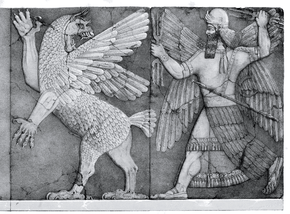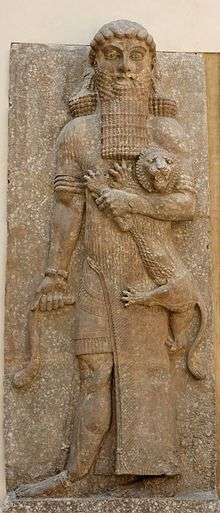Ninsun
In Sumerian mythology, Ninsun (also called Ninsumun, cuneiform: 𒀭𒊩𒌆𒄢 dNIN.SUMUN2; Sumerian: Nin-sumun(ak) "lady of the wild cows") is a goddess, best known as the mother of the legendary hero Gilgamesh, and as the tutelary goddess of Gudea of Lagash. Her parents are the deities Anu and Uras. Ninsun has also been linked to older deities.
| Ninsun | |
|---|---|
 Relief with the inscription "Nin-Sun". Louvre Museum. | |
| Abode | Uruk |
| Symbol | Cow |
| Personal information | |
| Parents | Anu and Uras |
| Consort | Lugalbanda |
| Children | Gilgamesh |
| Part of a series on |
| Ancient Mesopotamian religion |
|---|
 Chaos Monster and Sun God |
|
Seven gods who decree
|
|
Other major deities |
|
Demigods and heroes
|
| Related topics |
Mythology
In the Epic of Gilgamesh, Ninsun is depicted as a human queen who lives in Uruk with her son as king. Since the father of Gilgamesh was former king Lugalbanda, it stands to reason that Ninsun procreated with Lugalbanda to give birth. She assists her son in his adventure by providing him with the meanings of his dream in the beginning.
Also in the Epic of Gilgamesh, Ninsun is summoned by Gilgamesh and Enkidu to help pray to the god Utu to help the two on their journey to the Country of the Living to battle Humbaba.
Names
In the Tello relief at ancient Lagaš, dating to ca. 2150 BC, her name is written in cuneiform dNIN.SUMUN2. The meaning of sumun in Sumerian is "wild cow" and her name is also attested as dNIN.SUMUN2.NA Nin-sumunak, revealing its origin as a genitive phrase meaning "lady of the wild cows".[1][2] The sign SUMUN2 was formerly read SUN2, leading to the widespread usage of the name Ninsun. Other names include Rimat-Ninsun (from Akkadian rimātu "cattle"), the "August Cow", the "Wild Cow of the Enclosure", and "The Great Queen".
Related deities
In Sumerian mythology, Ninsun was originally called Gula until her name was later changed to Ninisina. Later, Gula became identified with the Babylonian goddess Nintinugga.
According to "Pabilsag's Journey to Nibru," Ninsun was originally named Nininsina. According to the ancient Babylonian text, Nininsina wedded Pabilsag near a riverbank and gave birth to Damu as a result of the union. Other sources give Gunura as Ninsun's husband and Damu's father.[3]
 Ur-Nammu dedication tablet for the Temple of Nin-Sun in Ur: "For his lady Nin-Sun, Ur-Nammu the mighty man, King of Ur and King of Sumer and Akkad, has built her Temple"
Ur-Nammu dedication tablet for the Temple of Nin-Sun in Ur: "For his lady Nin-Sun, Ur-Nammu the mighty man, King of Ur and King of Sumer and Akkad, has built her Temple"
See also
- Auðumbla
- Kamadhenu, cow from Hindu mythology
- Amalthea, goat who raised Zeus, who suckled on her breast milk
- Hathor, Egyptian cow goddess
References
- "ePSD: sumun[cow]". psd.museum.upenn.edu. Retrieved 2017-08-29.
- "ORACC List of Mesopotamian Gods and Goddesses".
- Jordan, Michael (1993). Encyclopedia of gods : over 2,500 deities of the world. Internet Archive. New York : Facts on File. pp. 91.
- Encyclopedia of Gods, Kyle Cathie Limited, 2002
- John A. Halloran, Sumerian Lexicon, 2003
External links
| Wikiquote has quotations related to: Ninsun |
